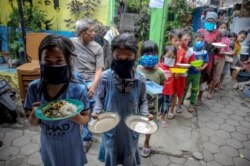Indonesia will ban people from traveling to celebrate Ramadan, bracing for a possible surge in COVID-19 cases in the largest Muslim-majority nation in the world by population.
Tens of millions of Indonesians who want to leave big cities for the holiday will be barred starting Friday, the government said Tuesday, marking a more aggressive response after it failed to convince people to stay put voluntarily.
Indonesia has been criticized as bungling its initial response to the virus, which at first it denied had spread to the nation.
Indonesian President Joko Widodo said a state survey before the ban found 68% agreed not to travel for Ramadan, but about one-fourth insisted on traveling.
“This means that there is still a very large number, which is 24%,” said the president, according to an announcement on the Ministry of Communication and Information Technology website.
Just as gatherings of Jews for Passover and Christians for Easter threatened to spread COVID-19, Muslim nations now must contend with the risk during Ramadan. Indonesia is the biggest of those nations, with 260 million people. It also has the most deaths linked to the virus of any Asia nation outside of China, at 616, though limited testing means the real figure is likely to be much higher.
Millions of Indonesians usually crowd onto buses and trains at this time of year to be with family for the holiday. Researchers said if the government had gone through with plans to allow such mobility, the virus could have spread to hundreds of thousands of people, particularly in rural areas where health care is weaker, local media reported. The Southeast Asian nation so far has reported 7,135 cases of COVID-19.
“The more mobility in the population at this critical point, the graver the outcome,” Belinda Spagnoletti, a research fellow at the University of Melbourne, wrote in the university’s Indonesia at Melbourne blog. She noted that travel during the holiday, known as mudik, is appealing, particularly to lower-income people who can be with their families if they lose their jobs or access to health care in the pandemic.
She said that “mudik provides a safety net for many Indonesians, but it also provides the ideal conditions to exacerbate the COVID-19 public health disaster in Indonesia.”
After months of denying it had a coronavirus problem, authorities in Indonesia eventually moved to close schools and businesses, cancel flights, mobilize medical workers and supplies, and provide government relief packages.
The president, popularly known as Jokowi, has said the government would distribute food aid starting in Jakarta, and then spreading beyond the capital city.
“Make sure that food stocks are sufficient,” he told his cabinet members Monday. “Make sure that when Ramadan comes, we really have a certainty about food stocks.”
Observers say the nation will need more aid to workers and businesses, as well as more testing, confinement and contact tracing.
“The Indonesian government needs to ramp up testing to know the true extent of the coronavirus outbreak in the country,” Andreas Harsono, senior Indonesia researcher at Human Rights Watch, said. “The authorities should also uphold the right to information and provide accurate statistics to the public.”







